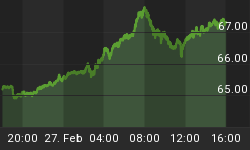The global economy continues to falter and the pace of that slowdown is picking up. Recent data showed that German consumer confidence dropped the most since 1998, as Italian confidence dropped to an all-time record low. The level of Spain's non-performing loans reached the highest since 1994. And Chinese consumer loan demand fell to the lowest since 2004, as their PMI continues to drop further below the line of expansion. To round things out, U.S. job openings fell by 325k, the most since September 2008. Meanwhile, the Philadelphia PMI fell the most in nearly a year and despite record low borrowing costs, Existing Home sales fell 1.5% in May.
Despite the prediction of Wall Street shills, Europe's funk is starting to affect the bottom line of U.S. multi-national corporations. A great example of this came from Proctor and Gamble. The global consumer goods company cut their revenue and earnings estimates for the second time in the last two months, blaming the slowdown in emerging markets, the recession in Europe and the negative impact from a rising U.S. dollar.
The plain truth is that the developed world is either flirting with or is in recession, while emerging market growth has been cut in half. And it now seems that since America brought down Europe in 2008 by exporting our credit and housing crisis, Europe is now returning the favor through a sovereign debt crisis.
The Europeans are hoping to solve their problems by performing a balance sheet game of three card monte. Where debt laden nations that can no longer afford to borrow money in the open market, instead make loans to entities called the EFSF and ESM, and then borrow that same money back. News out of Europe this week was that the ESM (once it is established) may be funded with as much as 400-500 billion Euros for the purpose of buying PIIGS debt. This amounts to only about 16% of Spanish and Italian outstanding public debt. Meanwhile, the exact funding sources for these entities are still up in the air.
Sadly, Europe has been placed on the life support of their governments that need to borrow and print money in order to keep interest rates from rising and their economies from imploding. Of course, borrowing and printing money is the bane of stable interest rates and a sound economy. So, it will surely backfire with extreme severity in the long term.
We now have the condition where worldwide financial markets are pining for printing presses to once again be fired up simultaneously across the globe. However, central bankers are reticent to accommodate their desire because counterfeiting more money when borrowing costs are already near zero percent is counterproductive. More money printing will not cause fallow resources to be utilized, nor will it encourage productivity enhancements. All it will do is put a floor under equity values as it sends commodity prices soaring. The trade off will be to place further pressure on the middle class, as their purchasing power and living standards will resume their decline.
The Fed is moving towards QE III, but will need to see any one of the following three conditions to be met before embarking on further monetary dilution: the unemployment rate climb back to 8.5%, from the current 8.2%; the S&P 500 falling below 1,200, from the current level of 1,330; or the YOY increase in CPI to fall below 1 percent, from the 1.7% of today.
In the interim, global markets and economies will continue to be pulled lower by the gravitational force associated with a deleveraging deflationary depression. Gold and other precious metals will continue to tread water until the full monetary assault begins from the ECB and the Fed. However, as I've stated before, gold mining shares have already priced in Armageddon in the metal price. And as such, are worthy of at least holding a small position ahead of what could be a moon shot in value if Bernanke and Draghi head back to the helicopters soon.















